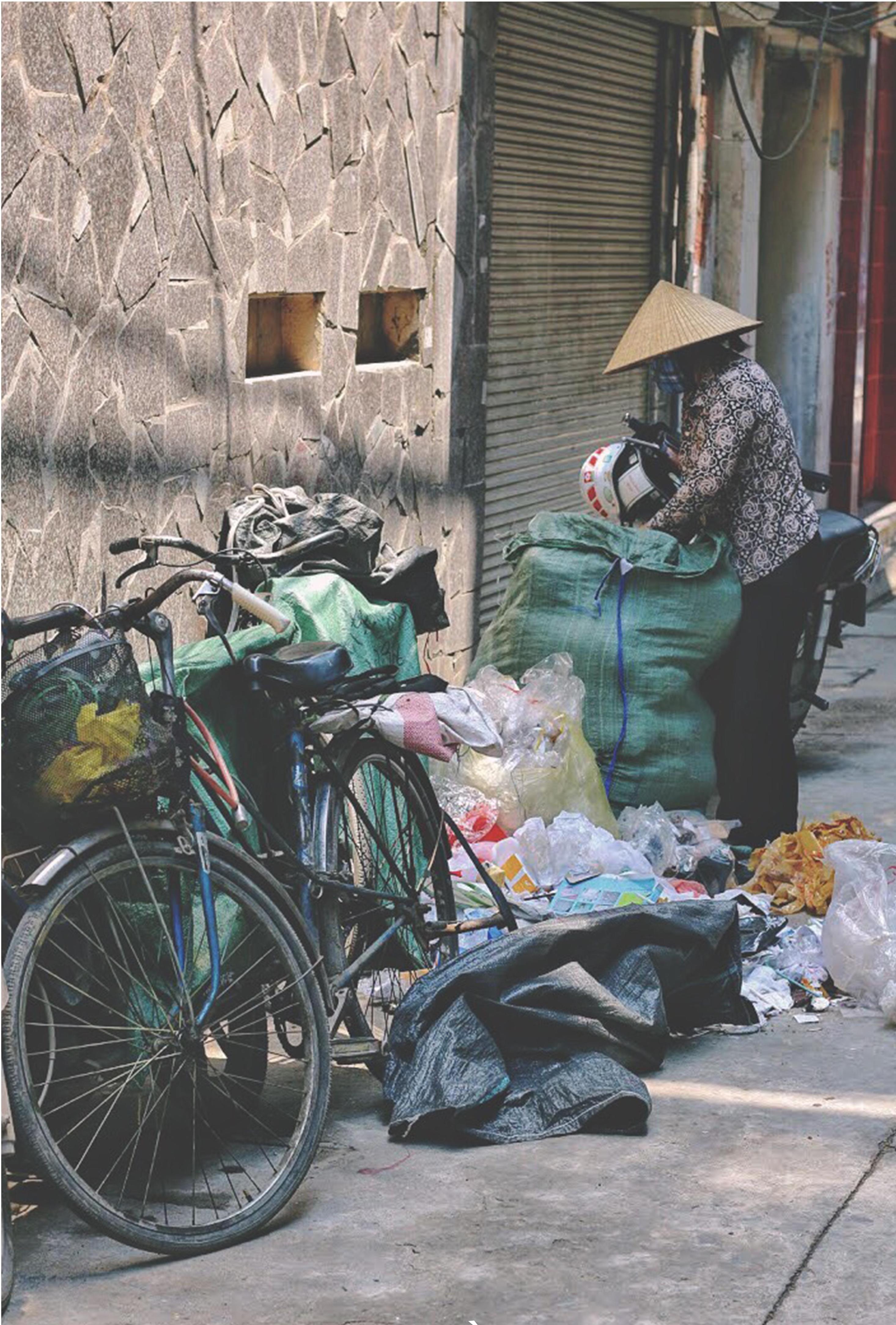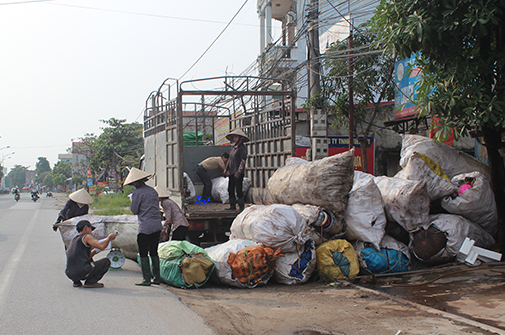“Promoting a new plastic waste management model in Vietnam, integrating the concept of the circular economy”
In 2017, Asia accounted for 50% of global plastic production. What has been the impact on the oceans?
Fanny Quertamp – The countries we work with under the Rethinking Plastics project are middle-income countries where there is rapid economic growth (almost 7% in Vietnam in 2019). These countries are therefore centres of plastic production and waste generation, in particular plastic waste. Consequently, there are major impacts on the environment: a very small proportion of this plastic waste can be collected, transported and treated with environmentally-friendly technologies. In urban areas, part of the recoverable waste is collected and partly recycled via the informal sector, but single-use plastics are directly discarded in the environment.[1]
At the same time, there is a growth in the urban population and the emergence of middle classes with new consumption patterns that generate an increasing amount of plastic waste (online buying, takeaways…). The current facilities and management system for waste have difficulty handling this exponential growth. Most of the waste thrown away outside homes or by the roadside very often ends up in canals, rivers, then oceans, as these countries have very dense water systems. So, it is important to react right now.
Have the Vietnamese authorities taken up the issue?
Fanny Quertamp – In Vietnam, plastic pollution has a very strong visual impact, for example, on beaches: there is therefore an awareness through images. This may have contributed to making the authorities aware that this situation is not viable due to the impacts on the economy (tourism, for example), biodiversity and health.
There is also a regional awareness: in June 2019, ASEAN adopted the Bangkok Declaration on Combating Marine Debris, which identifies the challenges and priority actions to be implemented in Southeast Asia. Each Member State is subsequently responsible for setting up an action plan. Vietnam approved its plan on 4 December 2019. The Vietnamese authorities have therefore now clearly identified the waste problem, particularly in municipalities, which must find solutions to collect and treat it. The objective for 2025 is to reduce marine plastic debris by at least 50%, collect 50% of lost or discarded fishing gear, for 80% of tourist coastal areas not to use disposable plastic products and non-biodegradable plastic bags, for beaches to have plastic waste collected and be cleaned up at least twice a year and for 80% of protected marine areas to no longer have plastic debris.
However, the reflection has not yet gone as far as how to produce with less plastic. Yet talking about plastic pollution is also a way of addressing another way of consuming and, beyond this, thinking about waste. This is the whole purpose of the circular economy, which starts with the prevention and reduction of plastic production, without simply considering the management of the waste produced. It is a vision that we will try to promote to our partners.
What are the challenges in Vietnam on the issue of plastic pollution?
Fanny Quertamp – The first challenge is scientific: you need to have reliable data on plastic pollution to be able to measure the actions implemented. It is difficult to have comprehensive knowledge about the quantities and type of waste discarded into the oceans. Existing figures are often estimates. As these are complex issues, it is necessary to define standardised and reliable methodologies to identify, quantify and have an overall view of the situation. There is also the issue of financing this research over the long term and how it can help establish effective environmental policies.
In addition to this challenge, there are four other challenges:
• A legal and technical challenge: it is necessary to establish appropriate norms and standards (at the national and regional levels) and ensure they are respected;
• Financing waste management facilities: there are increasing needs and this requires substantial financial resources;
• Institutional coordination: the decision-making on environmental policies and waste management is currently fragmented between a number of actors (between ministries, between the national and local levels);
• Raising the awareness of consumers: without the involvement of citizens on a daily basis, it will be difficult for public policies to have a significant impact. There is some awareness, with initiatives to clean up beaches, but these are still curative and not preventive actions.
How will the Rethinking Plastics project contribute to addressing these issues?
Fanny Quertamp – We are proposing a coherent ecosystem of actions, which aims to develop waste management models and, more generally, economic models. Our action in Vietnam – and in the other four partner countries – is based on five areas:
1) Support for the definition of appropriate public policies and the transition towards a circular economy (changes in regulations, studies…);
2) The creation of extended producer responsibility (EPR) chains, based on the polluter pays principle: for example, we are considering this in the plastic packaging sector with CITEO, a French eco-packaging company;
3) Sustainable plastic consumption and production, with a focus on the fight against single-use plastics and the development of standards for recycled plastics (labelling, certification…);
4) The management of marine debris directly produced by maritime activities. This is what we will work on with ports (to improve the collection of waste generated by boats and avoid it being dumped in the oceans) and with fishermen (so that they also participate in collecting waste);
5) The organisation of awareness-raising campaigns for the various publics (in particular young people and the media).
 |
| Photo credit: Le Thi Thao Trang. Thai Thinh-Dong Da District, Hanoi (2017) |
Our support involves technical assistance, but also demonstration through action, with the implementation of pilot projects bringing innovative solutions that can be replicated on a larger scale.
We are currently in the selection phase for pilot projects in EPR chains (area 2) and for sustainable plastic consumption and production (area 3). For marine waste management (area 4), we are working directly with the Ministry of Transport and Vina Marine, Vietnam’s maritime administration. They have identified Cat Lai Port, in Ho Chi Minh City, as a pilot port, as it is already implementing a sustainable development strategy. In terms of fishing, we are going to work with the Fishermen’s Association, which is present in all the maritime provinces in Vietnam: this will promote the subsequent extension of the pilot project to all ports.
What is the interest of a regional approach?
Fanny Quertamp – The regional approach is interesting because it brings up common issues, as our areas of operation are the same in the five partner countries. To promote these exchanges, we have a regional team of sectoral experts – in ports, waste management… – who work in each partner country of the project. They act as an intermediary with each national coordinator and contribute to the dissemination of good practices identified elsewhere.
Europe is actively combating plastics and will be able to provide its experience. For example, the diversity of EPR chains in European countries can serve as a model for Vietnam.
But the objective is also to look beyond the experience of European countries: as there are similar socioeconomic contexts, East and Southeast Asian countries can learn from each other’s experiences. For example, the pilot project under development in the fisheries sector is modelled directly on initiatives carried out in Thailand. Similarly, in the EPR chains, it is important to take the informal sector into account. It plays a major role in Vietnam in collecting, recovering and recycling recoverable waste, including plastic. The challenge lies in defining how to integrate them into this process under satisfactory socioeconomic and environmental conditions. In this respect, Indonesia’s experience is of great interest and could be mobilised.
 More about the project
More about the project
Fanny Quertamp is a geographer and has been working in Vietnam since 1996, where she has been involved in various scientific and technical cooperation projects. She holds a Ph.D. on periurban areas in Hanoi (2003) and has participated in several research projects between CNRS, IRD and the Academy of Sciences of Vietnam (1996-2001). Her research subsequently focused on the themes of urban planning and urban services. Since 2006, she has specialised in urban issues in Vietnam and the Southeast Asian region.
|
Find out more • Akenji, L., Bengtsson, M., Kato, M., Hengesbaugh, M., Hotta, Y., Aoki-Suzuki, C., Gamaralalage, P.J.D. & Liu, C. (2019), Circular Economy and Plastics: A Gap-Analysis in ASEAN Member States. Brussels: European Commission Directorate General for Environment and Directorate General for International Cooperation and Development, Jakarta: Association of Southeast Asian Nations (ASEAN) • Le Dai Thang, 2019. Overview of Marine Plastic Debris in Vietnam in Relation to International Context. FIG Working Week 2019, Geospatial information for a smarter life and environmental resilience Hanoi, Vietnam, April 22–26, 2019, 10p • Decision No. 491/QD-TTg dated 7 May 2018 of the Prime Minister approving the adjustment of the National Strategy on Integrated Solid Waste Management to 2025, with a vision to 2050 • Decision No.1746/QĐ-TTG, dated 4 December 2019 of the Prime Minister promulgating the national action plan for marine plastic waste management to 2030 • Ministry of Natural Resources and Environment of Vietnam (May 2018), Report on domestic solid waste management. |
[1] According to certain international organisations, plastic bags account for a large proportion of plastic waste in Vietnam as they are given free of charge by shops. An average of 35 bags are used per household per week. Every day, tens of millions of plastic bags are used and thrown away in the environment, but only 27% of them are collected, treated and recycled.


